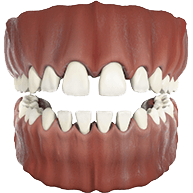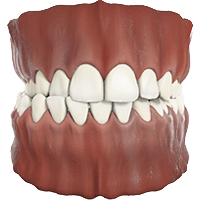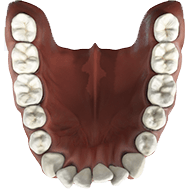Have you lost your teeth? Don’t worry, you are alone. Complete edentulism is a common issue. According to the WHO, the complete tooth loss prevalence is almost 7% among people aged 20 years or older, while there was a higher global prevalence of 23% in people aged 60 years or older.
No doubt that losing teeth comes with unpleasant consequences, including emotional, functional, and aesthetic drawbacks.
The emotional effects are related to the inability to smile freely and lowered self-esteem. The functional effects are more visible in the difficulty in eating, limited diet choices, digestive problems, and speech impairment. The impact of losing teeth on aesthetics is reflected in facial sagging and wrinkling because of the loss of bone support due to bone resorption, which results in a shorter face and hollow appearance.
Dental implants and dentures are the most common and effective treatment options for complete teeth loss. Here is a full comparison between dental implants and dentures to help you decide.
Dental implants and dentures: what is the difference
Dental implants are titanium screws embedded surgically inside your jawbone to replace the root of missing teeth and act as an anchor for the prosthesis. It requires a thorough examination and treatment planning. One of the main prerequisites of dental implants is the presence of sufficient bone. Otherwise, an additional step of bone graft is mandatory. The final restoration loading is after complete healing and osseointegration of the bone around the implant.


Dentures are removable prosthetics composed of a resin base of pink color to mimic the gingiva and hold the artificial teeth. They gain their retention by covering the whole intended arch to increase the surface area. For example, in the case of the maxillary arch, the hard palate is included in the denture base. It doesn’t require surgery and is suitable regardless of the amount of available bone. An impression is taken to construct a cast where the bite and teeth alignment is adjusted for optimum function.
Dental implants and dentures: pros and cons
Dental implants are superior in providing excellent function and esthetics, preventing further bone resorption, are easier to maintain, and can last for a lifetime. However, they require surgery, are expensive, and require sufficient bone width and height. Otherwise, an additional step of bone grafting may be needed.
While dentures are more affordable, spare you from any surgery, are delivered in a shorter time, and can compensate for any soft tissue defects. On the other hand, the stability of dentures is far less than implants (fixed inside bone), require relining or replacement with time, and may stimulate bone resorption.
Dental implants and dentures: suitability
Dental implants are suitable if you have a sufficient amount of bone, in addition to good general health. A considerable amount of bone is mandatory for jaw bone healing around the implant for implant success. If the bone amount is insufficient, an additional surgical step of bone graft will be required, which means more surgical steps and costs. Implants are not recommended in cases with delayed healing, as in cases of uncontrolled diabetes and cases with bleeding tendency.
Dentures are suitable for all cases and do not require a specific amount of bone. There are no medical conditions contraindicating denture construction except in cases of xerostomia because denture retention depends on the adhesion between the denture base and oral mucosa through a thin film of saliva.
Dental implants and dentures: time until final delivery
The treatment planning phase takes around 1-2 weeks. During surgery, the implants will be embedded inside your jawbone. The dental implants require around 3-6 months for complete healing and osseointegration with the jaw bone. The final prosthesis is constructed and delivered after healing. Meanwhile, you will be provided with a temporary restoration.
Dentures require around four weeks for delivery. During the first visit, an impression will be taken to construct a wax model for the restoration. On the next visit, your bite will be calculated, and you will try the wax model to set the final shape and positioning of the teeth. At the following visit, the dentures are delivered.
Dental implants and dentures: care and maintenance
Dental implants are cared for with the same routine as natural teeth: brush twice daily, floss at least once daily, and schedule regular check-up visits. for easy cleaning underneath the restoration, water pick may be beneficial. Try using a water pick for easy cleaning underneath the fixed restoration.
Denture care involves the removal of dentures after meals to brush them and clean the gingiva beneath. Before sleep, remove the dentures and soak them overnight in water or a cleaning solution. Dentures require regular check-up visits, where our dental experts can check the need for relining that may be frequent because of bone resorption caused by dentures.
For both treatment options, avoid using abrasive toothpaste and a hard toothbrush to prevent scratching of the artificial teeth.
Dental implants and dentures: cost
Dental implants are much more expensive than dentures. Complete arch replacement requires a minimum of 4-6 implants. The average cost of a single implant, including the prosthesis, is €2500-3000, while the complete denture cost is €1500-2000.
Implants do not need replacement as they can last a lifetime with proper care. However, complete dentures require replacement every 5-7 years.
Choosing between dental implants and dentures is not easy. Although they differ in multiple aspects, the final goal is the same: to deliver a natural-looking smile that provides comfortable function. The choice between dental implants and dentures is governed by your financial, medical, and oral conditions.
Both dental implants and dentures deliver a natural-looking smile. Dental implants are expensive and provide a lifetime restoration, while dentures are less costly and noninvasive but may need replacement over time.
At the Dental Care Center, we are world-leaders in Dental Implants, with patients coming from all across the UK.












